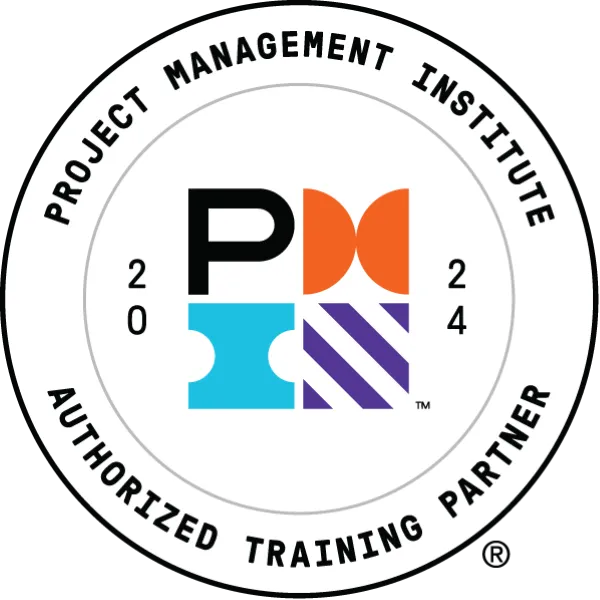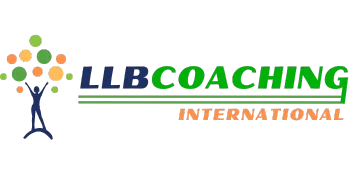
Premier Authorized Training Partner (ATP) of the
Project Management Institute®
Intensive Boot Camp for
Project Management Professional (PMP®) Certification Preparation
Increase Efficiency and Income with the Global Standard in Project Management Certification
The world is your classroom: Attend live classes from any web browser or connected device
Includes class materials from the Project Management Institute
(PMI®)Receive contact hours needed to take the PMP exam

Overview
Becoming PMP® certified signifies more than just a credential; it represents a commitment to excellence in project management. As a globally recognized certification, PMP® equips professionals with the knowledge, skills, and techniques needed to lead projects effectively and deliver results that align with organizational objectives. Holding a PMP® certification opens doors to new opportunities, enhances credibility in the field, and demonstrates mastery of industry best practices. Whether navigating complex projects or driving innovation within teams, PMP® certification empowers individuals to work with confidence, efficiency, and a strategic mindset, ultimately contributing to their personal and professional growth.
Why Get Certified?
Certification serves as a testament to your expertise and proficiency in a particular field, offering numerous benefits:
Validation of Skills: Certification validates your skills and knowledge, providing external recognition of your expertise.
Career Advancement: Certification can open doors to new career opportunities, promotions, and higher salaries by demonstrating your commitment to professional development and excellence.
Competitive Advantage: In competitive job markets, certification sets you apart from other candidates, giving you a competitive edge.
Industry Recognition: Being certified enhances your credibility and reputation within your industry, earning respect from peers, employers, and clients.
Personal Growth: Pursuing certification often involves acquiring new skills and knowledge, leading to personal growth and professional satisfaction.
Global Opportunities: Many certifications are recognized internationally, expanding your job prospects.

Keeping Current: Maintaining certification often requires ongoing education and staying up-to-date with industry trends, ensuring that your skills remain relevant in a rapidly evolving landscape.
In essence, certification is an investment in yourself and your future, providing tangible benefits that can propel your career forward.
Our Career Coaching Services
Transforming careers through personalized coaching and strategic guidance.
Career Assessment
and Exploration
Identify your strengths, interests, and values to explore potential career paths aligned with your aspirations. Gain clarity and confidence in making informed career decisions.

Coaching Corner - "The Wise PM"

Agile vs. Waterfall: Choosing the Right Methodology for Your Project (and Having a Laugh Along the Way)
Greetings, my fellow project management warriors! It’s your friendly neighborhood Wise PM here, ready to guide you through the great debate of Agile vs. Waterfall. Grab your coffee, sit back, and let’s dive into these two titans of project management with a side of humor. Because, let’s face it, project management without a sense of humor is like a project without a plan—chaotic and doomed to fail!
The Great Showdown: Agile vs. Waterfall
First off, let’s get one thing straight: neither Agile nor Waterfall is the “one-size-fits-all” answer to project management. They’re more like tools in your project management toolkit. Imagine Agile as a Swiss Army knife—flexible, adaptable, and full of surprises. On the other hand, think of Waterfall as a trusty hammer—solid, reliable, and straightforward. Now, let’s break down these methodologies and see which one fits your project best.
What’s the Deal with Waterfall?
Waterfall is the granddaddy of project management methodologies. It’s been around since the days when dinosaurs roamed the Earth—or at least since the 1950s. Here’s the deal with Waterfall:
1. Linear and Sequential: Waterfall follows a straight path. You complete one phase before moving on to the next. It’s like following a recipe: first, you mix the ingredients, then you bake, and finally, you eat the cake (my favorite part).
2. Great for Defined Projects: If your project has clear requirements and a well-defined scope, Waterfall is your best buddy. It’s perfect for construction projects, manufacturing, or any project where changes are about as welcome as a cat in a dog park.
3. Documentation Heaven: Waterfall loves documentation. If you’re a fan of detailed project plans, requirements specs, and having everything written down, you’ll feel right at home.
But here’s the catch: Waterfall can be as rigid as a two-by-four. If you hit a snag in the middle, you can’t just pivot and change direction. You have to backtrack, which can be a real headache. It’s like realizing you forgot the eggs halfway through baking a cake. Not fun, my friends, not fun.
Enter Agile: The Cool Kid on the Block
Agile, on the other hand, is the cool, trendy methodology that everyone’s talking about. It’s flexible, iterative, and loves change more than a chameleon at a color wheel convention. Here’s what makes Agile tick:
1. Iterative and Incremental: Agile breaks your project into small, manageable chunks called sprints. Each sprint is like a mini-project, complete with planning, execution, and review. It’s like cooking a five-course meal one dish at a time—less overwhelming and you get to taste as you go.
2. Great for Evolving Projects: If your project requirements are as stable as a Jenga tower in an earthquake, Agile is your savior. It thrives on change and adapts as you go along. Perfect for software development, product design, and any project where flexibility is key.
3. Collaboration Central: Agile is all about teamwork and communication. Daily stand-ups, sprint reviews, and retrospectives keep everyone in the loop. It’s like having a family dinner every night—lots of talking, some disagreements, but everyone’s on the same page.
But beware: Agile can be a bit too flexible if not managed properly. Without clear goals and disciplined team members, it can turn into a chaotic free-for-all. Imagine trying to cook that five-course meal with everyone adding their own ingredients whenever they feel like it. Yikes!
Choosing the Right Methodology
So, how do you choose between Agile and Waterfall? Here are a few wise tips from yours truly:
1. Assess Your Project Requirements: If your project has clear, unchanging requirements, Waterfall is your friend. If your project is likely to evolve, go Agile.
2. Consider Your Team: Do you have a team that thrives on collaboration and flexibility? Agile might be the way to go. If your team prefers structure and predictability, Waterfall is a safer bet.
3. Think About Your Stakeholders: Are your stakeholders comfortable with an iterative approach, or do they prefer seeing detailed plans upfront? Agile requires stakeholder buy-in and constant communication.
4. Evaluate the Risks: Waterfall is great for minimizing risks through thorough planning. Agile embraces risks by allowing for changes. Choose the methodology that aligns with your risk tolerance.
The Hybrid Approach
And here’s a secret from the Wise PM: sometimes, you don’t have to choose. Hybrid methodologies like Agile-Waterfall can give you the best of both worlds. Start with Waterfall’s structured planning phase and switch to Agile for execution and delivery. It’s like having your cake and eating it too—delicious and effective.
Conclusion
In the epic battle of Agile vs. Waterfall, the winner is… (drumroll, please) … the methodology that fits your project best! Remember, there’s no one-size-fits-all answer. Assess your project’s needs, your team’s strengths, and your stakeholders’ preferences, and choose the path that leads to success.
And most importantly, keep your sense of humor. Because in the world of project management, a good laugh can be the best tool of all.
Stay wise, stay flexible, and stay awesome, my project management warriors!
STILL NOT SURE?
Frequently Asked Questions
What can I expect from my first career coaching session?
In your first session, you'll discuss your career goals, challenges, and aspirations. The coach will assess your current situation and begin to outline a personalized action plan tailored to your specific needs.
How often will I meet with my career coach?
You typically meet with your career coach once a week or bi-weekly. Sessions can be adjusted to fit your schedule and the intensity of the coaching required, ensuring flexibility and effectiveness.
What are the benefits of career coaching?
Career coaching offers numerous benefits, including providing clarity and direction in one's career, enhancing job search strategies, and improving interview skills. It helps develop key professional skills and increases self-awareness, which are crucial for long-term career success and fulfillment. Coaches also offer personalized support and accountability, helping individuals navigate career transitions and expand their professional networks.
Can career coaching help with career transitions?
Yes, career coaching can be particularly valuable during career transitions. Coaches provide support and guidance that help individuals navigate changes more effectively. They assist in identifying transferable skills, refining resumes, and developing strategies for entering new industries or roles. Additionally, career coaches can offer insights into the market dynamics of new fields, help expand professional networks, and improve interview techniques, all of which are crucial for a successful transition. This personalized support can greatly reduce the stress associated with such changes and increase the likelihood of achieving career goals in the new field.
Do you offer support for negotiating job offers?
We provide comprehensive support to help you effectively negotiate job offers. Through detailed market research and personalized assessment, we help you understand your worth and articulate it confidently. Together, we'll strategize on how to approach negotiations, focusing on key aspects like salary, benefits, and role responsibilities to ensure you secure a competitive and satisfactory offer.
Is career coaching suitable for executives and senior professionals?
Yes, career coaching is highly beneficial for executives and senior professionals looking to enhance leadership skills, manage complex challenges, or navigate career transitions effectively.
What tools and resources do career coaches provide?
Coaches provide a variety of tools and resources, including personality and skills assessments, resume and LinkedIn profile optimization tools, interview preparation techniques, and network-building strategies.
How long does a career coaching engagement typically last?
A typical career coaching engagement lasts between three to six months, depending on individual goals and progress.
What qualifications and experience do your coaches have?
Our coaches are certified professionals with extensive experience in career development. They hold certifications from recognized bodies such as the International Coach Federation (ICF), the Project Management Institute (PMI) and have backgrounds in various industries, ensuring tailored and insightful guidance for clients across different career stages and sectors.
How can career coaching help me advance in my current job?
Career coaching can help you advance in your current job by identifying and developing key skills, setting achievable career goals, and enhancing your professional visibility and network. Coaches provide personalized feedback and strategies to improve performance and prepare for promotions, ensuring you effectively demonstrate your value and potential to your employer.
What is the success rate of your career coaching services?
Our coaching services have a strong track record of success, with many clients achieving significant career advancements, securing desired job roles, and reporting increased job satisfaction and personal growth.
COMPANY
CUSTOMER CARE
CUSTOMER CARE
NEWS
LEGAL

Copyright 2024. Stolte Alliance. All Rights Reserved.
